Edie Melson's Blog, page 90
May 5, 2023
God’s Gifts in Our Writing—3 Things for Every Writer to Remember
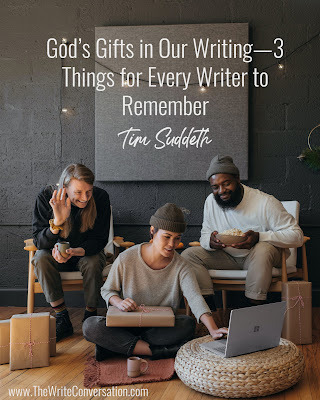
by Tim Suddeth @TimSuddeth
Last month, my mom had her ninetieth birthday. For several weeks leading up to her party, she was so excited. She hoped so and so would be there. (Mom, I’m sure they will try to come.) That the weather would be fine. (You know it’s April, Mom. We’ll hope for the best.) I hope I get a picture with all my great grandbabies. (I’m sure we’ll make that happen.)
The party is long over, but it is still bringing joy to my mom. On her dining room table, she has a stack of cards and gifts her friends and family gave her. She told me on a recent phone call that she still goes to the table and reads through them a couple of times a day.
We all know the joy that getting a gift brings. Birthdays, weddings, graduations, anniversaries are all days that we celebrate by giving gifts.
But have you ever thought about the gift that you are giving your readers?
I’m not talking about the story. I’m talking about if/since we think God has called us to write what we write, then He intends it to be a gift from Him to our reader or readers.
If He has sent us, it doesn’t matter to how many, does it?
What does writing a gift from God mean?
1. A gift represents the giver.
I am sure that most of the gifts Mom got she will never use. I remember with a lot of our wedding presents, one of the first questions I asked my wife was is it returnable?
But the usefulness of a gift isn’t what makes it valuable. It’s important because of who gave it to you.
We see this all the time on Antique Roadshow. I love that show. Especially when they bring out a hideous picture or vase. The owner doesn’t know that much about it except that they keep it in the closet or attic because nobody likes it. But Grandma, or Aunt Cleo, or a good friend, gave it to them.
The appraiser tells about its history and who made it. Then they give us the value of the object. Watching the owner’s face is one of the highlights of the show.
Their eyes get big. Then they look sideways and get a goofy smile as they tally up just how much money that is. Then, often they step back and sigh, “That’s great/good/amazing, but Papa gave that to us and it’s not for sale.”
The value of the gift didn’t come from its worth, but from the person who gave it.
If our writing is to be a gift from God to our readers, it isn’t because of who we are or what we have done, but because of who He is. I am just a hungry beggar telling another beggar where to find the Bread of Life. (By the way. Why is that beggar and not begger?)
2. A gift helps the receiver.
We are in the middle of a season where a lot of writing awards will be given out. Some of us have entered some of the contests. And if you are like me, you really want to win.
And there is nothing wrong with that. We should put in the hard work that is necessary to make our writing worthy of an award.
But if we are writing to be rewarded, or for approval, we are setting ourselves up for a lot of disappointment.
If we want our writing or any action to be a gift from God, we have to realize Who is sending it, and who He is sending it to.
I write mysteries and suspense. I want my stories to keep you on the edge of your seat. But I also want to show that there is hope in our dark world. And that there is a just, heavenly Judge on His throne.
3. A gift builds relationships.
It’s graduation season. And we are starting to receive graduation notifications (Not invitations, because the school doesn’t have room for you and the kid really doesn’t know you) from nieces and nephews, and the kids of friends and coworkers.
We will respond with some type of gift, maybe a book or a toaster or a gift card. Not because they know who we are, or the gift will be useful, but to let them or their parents know we care.
And God uses the talent He gave us to give gifts to both us and our readers because He wants a relationship with us. He doesn’t want to see us as another friend or like on social media. He wants to get to know us. Spend time with us. With you.
And He has made that perfectly clear. Not just in the gifts He has sent to and through us. But by the gift of His Son.
Do you realize Jesus is the only thing God couldn’t copy? He could have given a nation, a moon, or a galaxy for our salvation and immediately made another one to replace it. But His eternal, omnipotent, only beloved son Jesus has no peers. No substitute.
Jesus is His gift to us. From a cross.
Writing a gift from God demands a lot of responsibility.
TWEETABLEGod’s Gifts in Our Writing—3 Things for Every Writer to Remember from @TimSuddeth on @EdieMelson (Click to Tweet)
 Tim Suddeth is a stay-at-home dad and butler for his wonderful, adult son with autism. He has written numerous blogs posts, short stories, and three novels waiting for publication. He is a frequent attendee at writers conferences, including the Blue Ridge Mountain Christian Writers Conference and a member of Word Weavers and ACFW. He lives near Greenville, SC where he shares a house with a bossy Shorky and three too-curious Persians. You can find him on Facebook and Twitter, as well as at www.timingreenville.com and www.openingamystery.com.
Tim Suddeth is a stay-at-home dad and butler for his wonderful, adult son with autism. He has written numerous blogs posts, short stories, and three novels waiting for publication. He is a frequent attendee at writers conferences, including the Blue Ridge Mountain Christian Writers Conference and a member of Word Weavers and ACFW. He lives near Greenville, SC where he shares a house with a bossy Shorky and three too-curious Persians. You can find him on Facebook and Twitter, as well as at www.timingreenville.com and www.openingamystery.com.Featured Image: Photo by Surface on Unsplash
Published on May 05, 2023 22:00
May 4, 2023
Worldbuilding 101 for Writers: Climate and Geography

A.C. Williams @ACW_Author
What’s the most stunning landscape you’ve ever witnessed? Are you a mountain climber? A beach comber? An ancient history buff who marvels at the Mayan temple ruins tucked away in the jungles of Guatemala?
Are you cold-blooded and love soaking up the sun? Are you always hot and need a place where snow is common? Do you prefer humidity so thick you could cut it with a knife?
The type of world you live in affects just about everything in your life, and it has a huge influence on the culture and peoples who live there as well.
So far in this Worldbuilding 101 series, we’ve talked about Existing History, People and Social Circles, and Language and Communication. (see links below for previous posts) Those are all cultural concepts that should be informing the civilizations populating your storyworld. But what about the world itself? The type of world your people live in has just as much influence on them as their history and language. Today we’re going to talk about Climate and Geography in your storyworld.
The People
If you set your story in a mountain village, the people living there will have specific physical and cultural characteristics. The same is true if your story is set on an island near the equator.
Areas of the world that get more sun tend to have darker skinned populations. That’s a fact. So if you’re planning to have an equatorial island full of pale-skinned, white-haired people, you need to have a convincing reason for it.
Of course, there are always exceptions. People move around a lot, so it’s absolutely possible for someone whose ancestors began in a tropical climate to immigrate to a country far in the north where there is less UV radiation.
Home Construction
The location of your story’s setting in correlation with the planet’s equator has a direct effect on the skin tone of your people. If the place where your people are living is warm, they aren’t going to be wearing fluffy parkas and multiple layers (unless they’re sick and afraid that feeling cold will result in death, which is what happens in some cultures).
If your people live in a jungle, they will most likely live in well-ventilated huts. If your people live in an icy tundra where there are no building supplies, they’ll build igloos out of ice blocks.
It’s important to consider the types of construction materials that are available to the people you’re writing about. Even if you’re writing a contemporary novel, this matters a lot. Homes in New England are usually quite old, so they are built differently than homes in the rest of America. Homes in California are built to withstand earthquakes, while homes in the Central Plains are built to withstand enormous winds. The construction is hugely dependent on the geography and climate of the place where the home is located.
Food and Diet
Another enormously important factor related to climate and geography is the kind of foods your people eat. We may get into this in more detail in next month’s post, but you need to think about it.
If your storyworld takes place on barren tundra, your people aren’t going to know what coconut or pineapple taste like. If your story happens in a remote part of the Central Plains, it’s going to be more difficult to find a sushi restaurant to eat at.
Again, there are always exceptions. But if you don’t have a reasonable explanation for why your Pacific Islander character loves eating lutefisk, your readers are going to check out.
Health and Hygiene
Finally, you also need to consider some of the lifestyle habits of the people in your storyworld when it comes to the climate and geography of their homes.
A desert-wandering Bedouin is going to have many different lifestyle choices than an indigenous Kekchi person from the jungle of Guatemala. Likewise a Samoan person will treat their health and hygiene differently than an Inuit person.
They have different concerns. They have different problems because their climates are so completely different. Some deal with disease-carrying insects. Some deal with the threat of frostbite. Others deal with the potential for heat stroke and dehydration.
You aren’t going to wear a parka in the Sahara. Likewise, you probably won’t wear a bikini in the Arctic. Unless there’s something else going on, certain climates demand specific clothing to keep people safe and healthy. But in general, as long as you can give your readers a believable reason for why your story is different, it works. You just have to think it through.
If you haven’t taken the time to consider your story’s natural environments and how they affect your characters, you should. This is an essential part of creating a storyworld that your readers can experience and enjoy (or dread), and it’s something every author has to do, regardless if you’re writing contemporary romance or interplanetary science fiction.
How are you demonstrating climate and geography in the story you’re currently telling? What’s one way you can show your readers that you’ve done your homework?
TWEETABLEWorldbuilding 101 for Writers: Climate and Geography from author A.C. Williams (@ACW_Author) on @EdieMelson (Click to Tweet)
Don't Miss the Other Posts in this Series! PART 1 WORLDBUILDING 101 FOR WRITERS: DO YOU KNOW THE HISTORY OF YOUR STORY WORLD? PART 2 WORLDBUILDING 101 FOR WRITERS: WRITING PEOPLE GROUPS AND SOCIAL CIRCLES PART 3 WORLDBUILDING 101 FOR WRITERS: WRITING LANGUAGE AND COMMUNICATION
 Award-winning author, A.C. Williams is a coffee-drinking, sushi-eating, story-telling nerd who loves cats, country living, and all things Japanese. She’d rather be barefoot, and if she isn’t, her socks won’t match. She has authored eight novels, two novellas, three devotional books, and more flash fiction than you can shake a stick at. A senior partner at the award-winning Uncommon Universes Press, she is passionate about stories and the authors who write them. Learn more about her book coaching and follow her adventures online at https://www.amycwilliams.com.
Award-winning author, A.C. Williams is a coffee-drinking, sushi-eating, story-telling nerd who loves cats, country living, and all things Japanese. She’d rather be barefoot, and if she isn’t, her socks won’t match. She has authored eight novels, two novellas, three devotional books, and more flash fiction than you can shake a stick at. A senior partner at the award-winning Uncommon Universes Press, she is passionate about stories and the authors who write them. Learn more about her book coaching and follow her adventures online at https://www.amycwilliams.com.
Published on May 04, 2023 22:00
May 3, 2023
Find Inspiration for Every Part of Your Writing Journey in Scripture
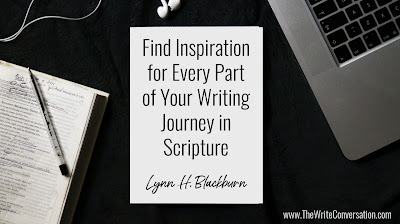
by Lynn H. Blackburn @LynnHBlackburn
I’m a big fan of writing inspiration.
I can spend a ridiculous amount of time scrolling through Pinterest and Instagram looking at funny memes, encouraging quotes, and blog posts that encourage me in my writing life.
But there is one source of inspiration, encouragement, and at times, a swift kick to the seat of the pants, like no other.
The Bible.
From the earliest days of my writing journey, the Lord has used various verses to give me hope, remind me of my calling, and to help me stay on the path He’s called me to.
In May 2010, at the Blue Ridge Mountains Christian Writers Conference, I found my first verse that I knew God wanted me to keep in my thoughts as my writing journey was just beginning.
Psalm 138:8 - The LORD will fulfill his purpose for me; your steadfast love, O LORD endures forever. Do not forsake the work of your hands. (ESV)
I was completely overwhelmed. It was the Wednesday morning of the conference. It had been a good week, the Lord had been so near, but I wasn’t sure what the future would look like. Or if there was even any point in trying to press on. I remember reading this and realizing that it wasn’t up to me. Yes, I needed to work. Yes, I needed to learn and grow and practice. But ultimately, the Lord was the one who would determine my future.
Later, as the months turned into years with no contract, I came across this verse.
Psalm 119:76 - Let your steadfast love comfort me according to your promise to your servant. (ESV)
I wrote this verse on a small piece of paper and used it as a bookmark for a while! I still have it! I needed the reminder that the promise wasn’t a publishing contract. The promise was that He would fulfill His purposes for me. And I clung to that.
Fast forward a few years. I had just turned in my fourth book. The spiritual battles during the writing of that book had drained me. I remember thinking that I might not be able to write anymore. Ever.
Enter Isaiah 41:13, which is the verse that I cling to like no other.
For I, the LORD your God, hold your right hand; it is I who say to you, “Fear not, I am the one who helps you.”
God gave me the image of the way I helped my children learn to write. I’d come behind them, wrap my arms around them, hold their hand in mine, and help them hold the pencil and form the letters.
Friends, have you ever considered what a holy thing it is, what a privilege beyond compare, to have the God of the Universe, THE Creator, helping you as you write? Can you picture the Holy Spirit enveloping you, guiding you, and quite literally helping you?
I knew in that moment that I would write more books. That I wasn’t done. That no matter how much fatigue—emotional, creative, spiritual, and physical—I was experiencing, that none of it would stand against the power of God, holding my hand and helping me.
One of the beautiful things about Scripture is that it is alive. It is active. It is powerful. A verse that speaks to me may not resonate with you, and that’s okay. The Holy Spirit knows exactly what you need and what will minister to you, and if you stay in the Word, He will give you what will minister to you in the most effective way.
I’d love to know what verses God has used to encourage you on your writing journey! Please share them with us in the comments.
Grace and peace,Lynn
TWEETABLEFind Inspiration for Every Part of Your Writing Journey in Scripture from author @LynnHBlackburn on @EdieMelson (Click to Tweet)
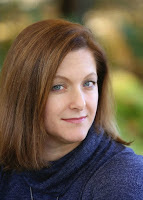 Lynn H. Blackburn loves writing romantic suspense because her childhood fantasy was to become a spy, but her grown-up reality is that she's a huge chicken and would have been caught on her first mission. She prefers to live vicariously through her characters and loves putting them into all kinds of terrifying situations while she's sitting at home safe and sound in her pajamas!
Lynn H. Blackburn loves writing romantic suspense because her childhood fantasy was to become a spy, but her grown-up reality is that she's a huge chicken and would have been caught on her first mission. She prefers to live vicariously through her characters and loves putting them into all kinds of terrifying situations while she's sitting at home safe and sound in her pajamas! Unknown Threat, the first book in her Defend and Protect series, was a 2021 Christy Award finalist and her previous titles have won the Carol Award, the Selah Award, and the Faith, Hope, and Love Reader’s Choice Award. Malicious Intent, the second book in the series, released March 2022.
She is a frequent conference speaker and has taught writers all over the country. Lynn lives in South Carolina with her true love and their three children. You can follow her real life happily ever after by signing up for her newsletter at LYNNHBLACKBURN.COMand @LynnHBlackburn on BOOKBUB, FACEBOOK, TWITTER, PINTEREST, and INSTAGRAM.
Featured Image: Photo by Jandré van der Walt on Unsplash
Published on May 03, 2023 22:00
May 2, 2023
Five Ways to Write an Opening that Shines
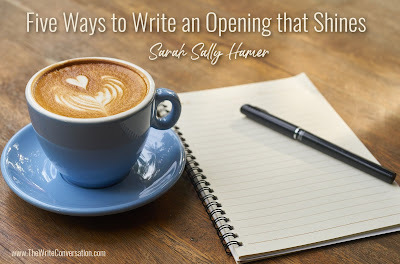
by Sarah Sally Hamer @SarahSallyHamer
Just how good is the opening of your story? It doesn’t matter whether you’re writing fiction or non-fiction, it HAS to be amazing.
Think about it this way: If you, as a reader, aren’t immediately drawn into a book, how long does it take you to put it down? I usually give the writer a pass if the first line isn’t stellar, but if the next one after that, and the next one after that, doesn’t hook me, I often won’t read any further.
So, here are five ways to make that opening—and the rest of the book!—shine:
1. In medias res
This is Latin for “in the middle of things.” In so many words, you may not need to start at the beginning and go through every detail. Star Wars (the very first movie) starts with a dogfight in space. Shakespeare in Love shows us poor Will struggling with writer’s block. They are perfect examples, allowing the reader to figure out some of the previous details without them being spelled out. Starting in the middle isn’t set in concrete but, especially in a book with lots of action, it can be the perfect opening. Here’s another one, from one of my stories: “He stepped back into a deep shadow and turned up his collar to hide his face.” We don’t know why for a long time because his pain is also the conflict. But it sets the reader in the middle of the action, right where we want them.
2. Set the tone
“Happy families are all alike; every unhappy family is unhappy in its own way.” –Leo Tolstoy, Anna Karenina. This is, of course, one of the most famous first lines in history, because it lets us know that we’re going to hear about an unhappy family and what they go through. Another one is While You Were Sleeping, a great movie with Sandra Bullock. Her character, Lucy, tells us about her sad “unimportant” life, where she wants a family. The tone is beautifully set, showing that we can expect a sweet story with a happy ending, although we’ll have to wait until the end to find it.
3. Introduce conflict
Galaxy Quest (yes, I love sci-fi!) starts with the crew of the TV series waiting to be introduced at a ComicCon-type convention. There is immediate and loud conflict between the characters—Tim Allen’s character is a pompous hypocrite, Alan Rickman bemoans his fate as a “hack”, Signorney Weaver’s character obviously has an unpleasant past with Tim Allen, etc., etc., etc. The conflict is set up and continues throughout the entire story.
In Pride and Predudice, we’re told that “It is a truth universally acknowledged, that a single man in possession of a good fortune, must be in want of a wife.” We know instantly that this book is going to be about the conflict a young woman experiences as she tries to meet the societal mores of her time period.
4. Establish voice
This is one of the most important. You, as the writer, have your own voice, but your POV character, whoever that is at the very beginning, has a voice also. Holden Caulfield in The Catcher in the Rye is a cynical and angry young man. We know that immediately by his words. Using one of my stories again: “I woke as I usually did from the dream: my face and pillow soaked with my tears, my fingers bleeding from the bite of my teeth to force my silence, to dampen my cries of despair.” Very dramatic, huh? 😊 But my fantasy heroine, Zara of the Birds, is a dramatic teenager with a boatload of problems.
5. Create a question
In Moby Dick, we’re told to “Call me Ishmael.” Why? Who is he? Why do we need to know his name? The name itself is associated with stories in the Old Testament. Will that be part of the book? What questions can you raise with your first sentence?
A few things NOT to do.
1. Don’t put a lot of description and/or backstory in the first couple of paragraphs. Both of these slow the action down and can put a reader off. If you must use backstory, consider a prologue or something very, very short that is directly attached to a character.
2. Don’t shock the reader. Well, maybe once in a while you can start a paragraph with something like this: “We shot dogs. Not by accident. We did it on purpose.” –Phil Klay, Redeploment. But that technique is like putting salt into a stew. You can overdo it.
3. Don’t worry too much about that first page until you know what the book is about. You might have to completely finish it before you really know the information you want. You can always come back and do it later.
Bottom LineThink about your story, your reasons for writing it, who your audience will be, and what you really want to say. Your first pages will reflect that, so it helps immensely for you to be completely sure.
What’s your favorite first line?
TWEETABLEFive Ways to Write an Opening that Shines from @SarahSallyHamer on @EdieMelson (Click to Tweet)
 Sarah (Sally) Hamer, B.S., MLA, is a lover of books, a teacher of writers, and a believer in a good story. Most of all, she is eternally fascinated by people and how they 'tick'. She’s passionate about helping people tell their own stories, whether through fiction or through memoir. Writing in many genres—mystery, science fiction, fantasy, romance, medieval history, non-fiction—she has won awards at both local and national levels, including two Golden Heart finals.
Sarah (Sally) Hamer, B.S., MLA, is a lover of books, a teacher of writers, and a believer in a good story. Most of all, she is eternally fascinated by people and how they 'tick'. She’s passionate about helping people tell their own stories, whether through fiction or through memoir. Writing in many genres—mystery, science fiction, fantasy, romance, medieval history, non-fiction—she has won awards at both local and national levels, including two Golden Heart finals.A teacher of memoir, beginning and advanced creative fiction writing, and screenwriting at Louisiana State University in Shreveport for over twenty years, she also teaches online for Margie Lawson at www.margielawson.com. Sally is a free-lance editor and book coach at Touch Not the Cat Books, with many of her students and clients becoming successful, award-winning authors. You can find her at hamerse@bellsouth.net or www.sallyhamer.blogspot.com
Published on May 02, 2023 22:00
May 1, 2023
Dialogue or Dialog?
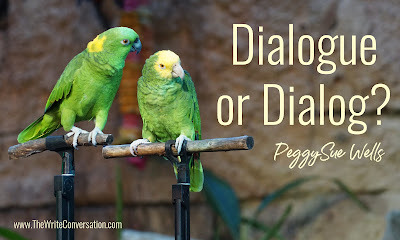
by PeggySue Wells @PeggySueWells
Dialogue is a conversation between two or more.
Primarily found in North America, dialog is an alternative spelling of the word dialogue. This alternative spelling became popular in the 1980s when it became a computer term and has become the spelling used most often in the United States. The Oxford English Dictionary still shows the preferred spelling as dialogue.
Beyond the spelling question, dialog is what characters say. Powerful stories are dialog driven through carefully chosen word selections.
The four purposes of dialog in your story include:
1. Move your story forward.
In Luke 1:30-33 Scripture reports, “The angel said to her, “Do not be afraid, Mary; you have found favor with God. You will conceive and give birth to a son, and you are to call him Jesus. He will be great and will be called the Son of the Most High. The Lord God will give him the throne of his father David, and he will reign over Jacob’s descendants forever; his kingdom will never end.”
With a relatively short conversation, the angel provides a lot of information that greatly moves forward the story of God’s plan for the world.
2. Reveal something important about your plot.
The angel of the Lord provides a vital and life-changing plot point when the angel says to the shepherds, “Do not be afraid. I bring you good news that will cause great joy for all the people. Today in the town of David a Savior has been born to you; he is the Messiah, the Lord. This will be a sign to you: You will find a baby wrapped in cloths and lying in a manger,” (Luke 2:10-12).
3. Show something important about your character.
After Jesus was born in Bethlehem in Judea, during the time of King Herod, Magi from the east came to Jerusalem and asked, “Where is the one who has been born king of the Jews? We saw his star when it rose and have come to worship him,” (Matthew 2:1-3).
Scripture says Herod was greatly disturbed by the report of the Wisemen. Herod sent the wise men to Bethlehem with these instructions, “Go and search carefully for the child. As soon as you find him, report to me, so that I too may go and worship him.”
With this concise exchange, we quickly understand the integrity of the wise men who traveled long and far to worship the Savior. We also see the cunning and conniving character of Herod.
4. Give your character a unique voice.
When Simeon takes the eight-day-old Christ child into his arms, we hear the unique voice of a faithful saint who has waited on the Lord’s timing and understands his own place in the story.
Simeon praised God, saying: “Sovereign Lord, as you have promised, you may now dismiss your servant in peace. For my eyes have seen your salvation, which you have prepared in the sight of all nations: a light for revelation to the Gentiles, and the glory of your people Israel,” (Luke 2:28-32).
When writing, filter your dialog through these four purposes to be certain the segment is earning its place as a contributor to your project.
If the words your characters are speaking do not add to your story, how can you reword or add value to your dialog? After all, the conversations that take place between characters are often the reader’s favorite part.
TWEETABLEDialogue or Dialog - insight and 4 important purposes for dialogue in your story from author @PeggySueWells on @EdieMelson (Click to Tweet)
 Tropical island votary and history buff, PeggySue Wells parasails, skydives, snorkels, scuba dives, and has taken (but not passed) pilot training. Writing from the 100-Acre Wood in Indiana, Wells is the bestselling author of thirty books including The Slave Across the Street, Slavery in the Land of the Free, Bonding With Your Child Through Boundaries, Homeless for the Holidays, Chasing Sunrise, and The Ten Best Decisions A Single Mom Can Make. Founder of SingleMomCircle.com, PeggySue is named for the Buddy Holly song with the great drumbeat. At school author visits, she teaches students the secrets to writing and speaks at events and conferences. Connect with her at www.PeggySueWells.com, on Facebook at PeggySue Wells, and LinkedIn at linkedin.com/in/peggysuewells
Tropical island votary and history buff, PeggySue Wells parasails, skydives, snorkels, scuba dives, and has taken (but not passed) pilot training. Writing from the 100-Acre Wood in Indiana, Wells is the bestselling author of thirty books including The Slave Across the Street, Slavery in the Land of the Free, Bonding With Your Child Through Boundaries, Homeless for the Holidays, Chasing Sunrise, and The Ten Best Decisions A Single Mom Can Make. Founder of SingleMomCircle.com, PeggySue is named for the Buddy Holly song with the great drumbeat. At school author visits, she teaches students the secrets to writing and speaks at events and conferences. Connect with her at www.PeggySueWells.com, on Facebook at PeggySue Wells, and LinkedIn at linkedin.com/in/peggysuewellsFeatured Image: www.EdieMelson.com
Published on May 01, 2023 22:00
April 30, 2023
5 Famous Quotes about Mothers that Should Inspire Writers
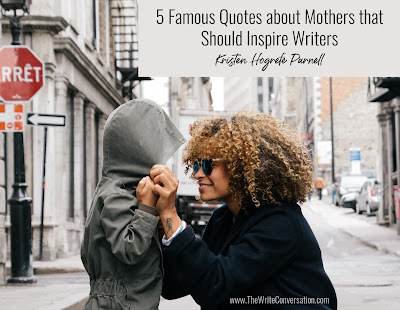
By Kristen Hogrefe Parnell @khogrefeparnell
May brings more than rain showers and spring flowers. It brings the reminder to celebrate and thank our mothers. Beyond a day of gratitude, Mother’s Day should challenge us to sit at the feet of the wonderful women who have taught us so much—and still have so much to teach us.
As writers, we have much to learn from our mothers.
Five Famous Quotes about Mothers that Speak to Writing Pursuits
#1: Dare all things.
Agatha Christie wrote, "A mother's love for her child is like nothing else in the world. It knows no law, no pity. It dares all things and crushes down remorselessly all that stands in its path."
Dares all things.
We writers can be easily intimidated or even embarrassed that our gift isn’t good enough compared to someone else’s.
Hogwash, say our mothers. Although I realize some of you reading this post did not experience the unrelenting love most mothers have for their children—and I am truly sorry for that—as a rule, our mothers would do and dare anything for us. As a mom to a now nine-month-old, I can relate to this mama bear grit that loves fiercely and defends loyally.
Let that drive and daring inspire your writing.
#2: Give something worthwhile.
I love this sweet quote by George Washington: "My mother was the most beautiful woman I ever saw. All I am I owe to my mother. I attribute my success in life to the moral, intellectual and physical education I received from her.”
What have our mothers given us? More than words can record, that is for sure.
The challenge for us writers is to give generously and purposefully as well. What will leave behind for those who read our words? Will we inspire someone else in their “moral, intellectual, and physical” endeavors?
#3: Believe the best.
This quote by Roald Dahl made me laugh, but it is oh so true. "It's a funny thing about mothers... Even when their own child is the most disgusting little blister you could ever imagine, they still think that he or she is wonderful."
Did my baby just have the biggest blowout? Toss his spoon of sweet potatoes on the floor? Drool all over my Sunday outfit? Yep. Yep. Yep. Is he still the most darling baby ever? Absolutely.
Should not we writers learn to view that grimace-worthy first draft with similar faith? That even in the mess, we can find something wonderful? Let’s believe the best about the projects God has given us, even though we should also be willing to make them better.
#4: Be the truest friend.
Washington Irving wrote, "A mother is the truest friend we have, when trials heavy and sudden, fall upon us; when adversity takes the place of prosperity; when friends who rejoice with us in our sunshine desert us; when trouble thickens around us, still will she cling to us, and endeavor by her kind precepts and counsels to dissipate the clouds of darkness, and cause peace to return to our hearts."
Not only should we writers be true to ourselves and our calling, but we must also be true to our fellow writers on this journey with us. No one understands the creative life’s highs and lows, triumphs and blows like another writer does.
Celebrate your sister or brother who receives the award and recognition, even if you haven’t received yours yet. Also, be willing to encourage the fellow writer who has received yet another rejection letter or feels tempted to quit.
Be the truest friend.
#5: Dwell in hope.
"Youth fades; love droops; the leaves of friendship fall; A mother’s secret hope outlives them all." So said Oliver Wendell Holmes, Sr.
A mother’s hope, faith, and prayers have reinvigorated us when we would otherwise quit.
I don’t know how many poorly written stories or rough drafts my mother (and father) read for me when I started writing stories as a pre-teen. They could easily have rolled their eyes at my weak attempts. Instead, they gave me the hope to keep writing, pointed out the good that others might have overlooked, and challenged me to keep writing even when I didn’t know where the journey might lead me.
Even now, I can call my mom and share about my latest writing highs and lows, and I know she will never tell me to quit. She will encourage me to keep hoping and trusting God for the right opportunities. And for that, I am very thankful.
How will you thank your mother this Mother’s Day? What lesson has she taught you that has made you a better writer?
TWEETABLE5 Famous Quotes about Mothers that Should Inspire Writers from author @KHogrefeParnell on @EdieMelson (Click to Tweet)
 Kristen Hogrefe Parnell writes suspenseful fiction from a faith perspective for women and young adults. Her own suspense story involved waiting on God into her thirties to meet her husband, and she desires to keep embracing God’s plan for her life when it’s not what she expects. Kristen’s books have won the Selah Award and the Grace Award, among others, and her inspirational romantic suspense novel, Take My Hand, is now available. An educator at heart, she also teaches English online, enjoys being a podcast guest, and blogs about biblical encouragement for mamas. Kristen lives in the Tampa, Florida area with her husband and baby boy. Connect with her at KristenHogrefeParnell.com.
Kristen Hogrefe Parnell writes suspenseful fiction from a faith perspective for women and young adults. Her own suspense story involved waiting on God into her thirties to meet her husband, and she desires to keep embracing God’s plan for her life when it’s not what she expects. Kristen’s books have won the Selah Award and the Grace Award, among others, and her inspirational romantic suspense novel, Take My Hand, is now available. An educator at heart, she also teaches English online, enjoys being a podcast guest, and blogs about biblical encouragement for mamas. Kristen lives in the Tampa, Florida area with her husband and baby boy. Connect with her at KristenHogrefeParnell.com.Featured Image: Photo by Sai De Silva on Unsplash
Published on April 30, 2023 22:00
April 29, 2023
How to Choose Which Writing Idea to Pursue When You have Too Many Options
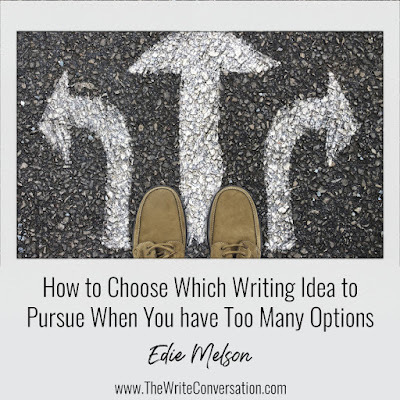
by Edie Melson @EdieMelson
I’ve talked with a lot of writers through the years. One recurring question I get is about where they should focus their efforts.
There are seasons in a writer’s life when the ideas are almost too numerous to count. One of these seasons often happens at the beginning of the writing journey. When we’re just starting out we’re often unsure about what our ultimate path will be. Take heed though, this dilemma is a season. And seasons tend to repeat themselves.
For myself, I had ideas for novels, book length nonfiction, devotions and articles—with a couple of poems thrown in the mix. I thought attending a conference would help. I reasoned that I could judge where to focus by which items I was asked to submit. Makes sense, right?
Yeah…not so much.
It seemed like every professional I spoke with liked my pitch and asked me to submit my idea (except the poetry). I was back to square one. So what was I going to do?
I decided to work on all of my ideas that had been submitted.
I prioritized the ones that I could finish quickest. This didn’t mean I took short cuts. I took the time to send in the very best manuscript I could.
But I finished one thing, submitted it and moved on to the next.
Here are the valuable lessons from weeding out writing ideas:
1. I figured out what I like to work on best. At that point in my career, I found I loved doing the “short stuff”—articles, devotions, and copy writing. Finishing something and having it accepted brought me more joy than closeting myself away with a book-length manuscript that would need months of work before I even found out if it were viable. Others will find different answers, but we just don't know until we dive in.
2. I discovered what I was good at. Turns out I have a knack for the short stuff. And I found out I’m really good at writing the short, pithy statements that copy writers have to do.
3. Submitting in multiple areas gave me a good read on what would work for longer projects. This process actually helped me come up with my first published book.
So when I’m approached by a writer who’s struggling with whether to submit this article, write this devotion, try authoring a book. I encourage them to try it all.
My answer generally catches them by surprise.
This approach is like a farmer sowing seeds. I’ve never seen a farmer pull out a handful of seeds, search through them and choose only one or two to plant.
What I’ve seen is farmers sowing a lot of seeds at a time, casting them into the prepared soil (often with machines). They do this knowing that not all seeds take root and grow.
I’ve discovered that as writers, we would do well to follow this model.
TWEETABLEHow to Choose Which Writing Idea to Pursue When You have Too Many Options from @EdieMelson (Click to Tweet)
 Edie Melson is a woman of faith with ink-stained fingers observing life through the lens of her camera. No matter whether she’s talking to writers, entrepreneurs, or readers, her first advice is always “Find your voice, live your story.” As an author, blogger, and speaker she’s encouraged and challenged audiences across the country and around the world. Her numerous books reflect her passion to help others develop the strength of their God-given gifts and apply them to their lives. Connect with her on her website, through Facebook, Twitter and Instagram.
Edie Melson is a woman of faith with ink-stained fingers observing life through the lens of her camera. No matter whether she’s talking to writers, entrepreneurs, or readers, her first advice is always “Find your voice, live your story.” As an author, blogger, and speaker she’s encouraged and challenged audiences across the country and around the world. Her numerous books reflect her passion to help others develop the strength of their God-given gifts and apply them to their lives. Connect with her on her website, through Facebook, Twitter and Instagram.
Published on April 29, 2023 22:00
April 28, 2023
Increase Your Writing Productivity With This New Habit

by Ginny Cruz, MPA, PT
I love to-do lists, calendars, and fresh paper. My affection for productivity began in elementary school. When the crisp fall air arrived, I couldn’t wait to buy school supplies. My heart adored selecting new spiral-bound notebooks and yellow pencils. Unfortunately, few friends shared my enthusiasm. Even now, when back-to-school time arrives, I consider buying some lined paper.
Today, my colleagues chuckle that I have lists of lists. My desk is scattered with hastily written notes of things to remember, such as books to buy, items to write down on my calendar for another day, and random thoughts that may end up in a blog or article. But many of those notes end up being reorganized over and over or tossed aside in frustration.
The New HabitIn my lifelong effort to gain control over my daily projects, I recently stumbled across a new habit of using my phone’s electronic calendar to keep my activities organized. I use my smartphone frequently and do my best to keep up with the latest technology. Of course, having young adult children who prefer texting to phone calls helps. While I’ve switched some things from my old way of doing it to using my phone, I’ve resisted using my electronic calendar, preferring my trusty day planner. My physical planner allows me to see the entire week or month at a glance, a feature my visual self loves. Plus, I adore the feeling of writing on paper. Pecking away on a phone keyboard, even using fun emoji shortcuts, doesn’t give me the same thrill.
My new habit started during the infamous COVID lockdown because my work shifted to remote. Our team was on video calls throughout the day, and my calendar dinged, notifying me what meeting was next. I grew to enjoy the notifications and began to trust that my phone would keep me on track without anxiously checking my physical calendar and wristwatch, as was my prior habit.
How Writers Can Use an Electronic Calendar One morning as I cried out to God for help completing my book before the rapidly-approaching deadline, he gently reminded me about my calendar notification feature. So, I scheduled my writing time on my smartphone’s calendar. Each day I planned a few hours to write. The calendar’s ding notified me when to begin and when to end. When it was time to stop, I'd quickly finish and wait to write again until the next scheduled time. I found this habit relaxed my mind knowing my calendar would "tell me" when the time was up. Following this new method improved my writing because my thoughts didn’t wander off to check on the time.
My mind often becomes anxious when big projects loom, such as completing a book by the deadline. Using my electronic calendar decreased my sense of feeling overwhelmed. Writing a little bit each day helped me finish my book, including the first edits, two weeks before the deadline. Plus, I never felt overwhelmed. I trusted my calendar would tell me when to begin and when to end each day, and it worked.
After my assigned writing time, I programmed other items into my calendar, such as house cleaning or errands. While I had to discipline myself to complete each task when my calendar “told” me it was time, this new habit worked. I admit, there are days my mind falls back into old ways of keeping up with handwritten notes on scraps of paper because old habits are slow to die. Using this new calendar notification feature is a work in progress, but one I know works for me.
While I still use my old-fashioned (as the kids call it) day planner and will continue to do so, I’ve grown to love and use my electronic calendar more each day. Those notification dings gently remind me what’s next without my remembering to look at the calendar or keeping up with sticky notes.
Bottom LineIf you’re facing a big deadline or struggle to sit in the chair and write each day, consider a trial period of using your electronic calendar that can notify you when to begin and end. Then, pray for strength and discipline to keep up with what your "to-do" list says to do.
What methods have you found that increase your writing productivity?
TWEETABLEIncrease Your Writing Productivity With This New Habit from author Ginny Cruz on @EdieMelson (Click to Tweet)
 Ginny Cruz, MPA, PT is a pediatric physical therapist, early intervention specialist, and award-winning author. Her writing encourages and teaches moms simple and effective ways to help their baby meet developmental milestones. In addition to writing, she enjoys hiking, reading, and camping with her husband. Find out more at ginnycruz.com, Instagram, or Facebook.
Ginny Cruz, MPA, PT is a pediatric physical therapist, early intervention specialist, and award-winning author. Her writing encourages and teaches moms simple and effective ways to help their baby meet developmental milestones. In addition to writing, she enjoys hiking, reading, and camping with her husband. Find out more at ginnycruz.com, Instagram, or Facebook.
Published on April 28, 2023 22:00
April 27, 2023
5 More Things to Do When You Can’t Attend a Writers Conference

by Lori Hatcher @LoriHatcher2
On Friday, February 28, 2020, I wrote a post for The Write Conversation called, “Six Things to Do When You Can’t Attend a Writers Conference.” I marvel at God’s timing for that post. Less than a month later, the country shut down due to COVID, and no one could attend a writers conference. Or any other conference.
By God’s good grace, we’re on the other side of the COVID crisis and are again gathering for conferences. But a pandemic isn’t the only thing that might keep you away from a conference. Scheduling conflicts, family dynamics, finances, health, or other obstacles could hinder you from attending.
If you’re unable to participate in an in-person gathering, you can still move forward in your writing life. In addition to the six ideas I proposed in my original post, I’d like to share five more.
5 Things to Do When You Can’t Attend a Writers Conference:
1. Read an industry classic in your genre. Here are some widely recommended ones:
On Writing (and Writers) A Miscellany of Advice and Opinions C.S. Lewis16 Ways to Create Devotional Writing to Renew the Spirit and Refresh the Soul David Sluka Articles! Articles! Articles! Your Comprehensive Guide Linda Gilden Story Trumps Structure: How to Write Unforgettable Fiction by Breaking the Rules Steven James On Writing Well: The Classic Guide to Writing Nonfiction William Zinsser
2. Read at least two books in your genre—twice. First, read them as a reader. Savor them without analyzing. Enjoy the ebb and flow of the words. Then, read them again as a writer. Ask yourself, what do I like about this book? What do I dislike? What elements add or subtract from my reading experience? How would I describe the author’s voice? Identify beautiful or powerful sentences and write a few of your own in that style.
3. Plan your own writers retreat. As conference season rolled around one year, I realized that attending a conference wouldn’t be the best use of my time. I was working on a contracted book, so I had nothing to pitch. I’d have loved chatting it up with industry professionals and making new writer friends, but what I really needed was BIC (Butt in Chair) time to complete my manuscript. Instead of attending a conference, I invited two other serious, like-minded writer friends who also needed uninterrupted BIC time to spend five days away working on our projects. We split the expenses, had a grand time, and got lots of writing done.
4. Invite writer friends to share their knowledge. Ask each friend to come prepared to share one their best tips or tricks they’ve learned about writing, editing, social media, graphic design, or marketing. Share a simple lunch or snack, and end your time together by praying for your writing goals.
5. Ask a like-minded writing friend to be your prayer and accountability partner. Commit to check in at least once a month (or, even better, once a week) to share goals and progress. Exchange writing-related prayer requests and pray for and with each other. You’ll be amazed at how much writing you’ll get done when someone else is holding you accountable. And when they pray God’s power into your writing life? Watch out, world!
I hope you’re convinced you can do much to advance your writing life in non-conference years. With a little initiative and creativity, this could be your best writing year yet.
Now it’s your turn. What do you do to move your writing life forward when you’re unable to attend a writing conference? Share your ideas in the comment section and join the conversation.
TWEETABLE5 More Things to Do When You Can’t Attend a Writers Conference from author @LoriHatcher2 on @EdieMelson (Click to Tweet)
 Lori Hatcher is an author, blogger, writing instructor, women’s ministry speaker, and career dental hygienist. She writes for Our Daily Bread, Guideposts, Revive Our Hearts, and Crosswalk.com. Check out her latest devotional, Refresh Your Hope, 60 Devotions for Trusting God with All Your Heart from Our Daily Bread Publishing. Connect with her at www.LoriHatcher.com or on Facebook, Twitter (@lorihatcher2) or Pinterest (Hungry for God)
Lori Hatcher is an author, blogger, writing instructor, women’s ministry speaker, and career dental hygienist. She writes for Our Daily Bread, Guideposts, Revive Our Hearts, and Crosswalk.com. Check out her latest devotional, Refresh Your Hope, 60 Devotions for Trusting God with All Your Heart from Our Daily Bread Publishing. Connect with her at www.LoriHatcher.com or on Facebook, Twitter (@lorihatcher2) or Pinterest (Hungry for God)
Published on April 27, 2023 22:00
April 26, 2023
See How It's Done - First Page Critique
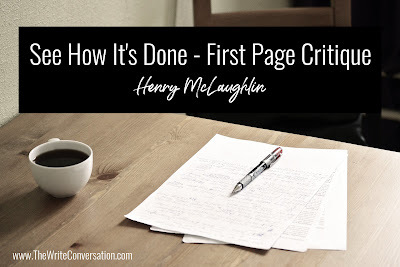
Today, I’m sharing the first page of a story from a brave author, who shall remain anonymous. It’s a story about a soldier returning from Vietnam. My critique follows the original.
Berkton, Indiana June 1970
Leith Fleming stared up at the small-town church building before him, taking in the familiar sight of the peeling blue paint and the tall, white steeple. The double doors were open, and people, dressed up in their Sunday best, streamed in, talking and laughing.
“Whatcha waitin’ for?” Mary asked, and Leith looked over at his wife and grinned.
“Just thinking about how everything’s just as it was before. See? Mrs. Gladford’s even wearing that same yellow dress that makes her look like a duck.”
“Leith!” Mary exclaimed, sounding both appalled and amused.
“Weawy?” Noah asked, his blue eyes going wide. “She’s a duck?”
“Now look what you’ve done, you chump,” Mary scolded. “No, Noah. Mrs. Gladford is not a duck.”
The three-year-old looked disappointed. “Oh.”
Leith just laughed. “Com’on, we’d better hurry, or they’re gonna start without us.” He started forward, ignoring Mary’s muttered comment about how she wasn’t the one wasting time calling people ducks.
But even as they settled in their pew, Leith couldn’t help but feel as if something was... off. He’d expected more of a greeting after being gone for a year, yet only a few people had acknowledged him back
After the sermon, Leith and his family joined the stream of people filing out of the church. There was a picnic, so everyone headed to the long, food-loaded tables set up on the lawn.
Balancing a plate in one hand and a cup of lemonade in the other, he squinted in the bright June afternoon light and scanned the crowd for his family. He quickly spotted them sitting under the sprawling oak, Mary trying to have a conversation with another lady, all while juggling a plate full of food and a restless Noah.
Leith headed over with a grin tugging at his mouth. Carefully setting his food down on the grass, he scooped Noah up and hoisted him with ease onto his shoulders. The boy giggled with glee, wrapping his small hands around the front of Leith’s shirt.
At the sound of Noah’s laugh, Mary looked up. Her gray-blue eyes twinkled at the sight, and a smile lit up her round, pretty face.
My critique: Berkton, IndianaJune 1970
Good way to anchor us in place and time
This story has a strong beginning. You plant seeds of tension and foreshadowing nicely. A very real part of the culture in 1970s was soldiers weren’t honored or treated with respect. I like the hint of PTSD. Very subtle plant—well done.
The major criticism is I think the writing could be tighter. Some words are unnecessary or redundant.
Leith Fleming stared
“Whatcha waitin’ for?” Mary asked.
Keith grinned at his wife. “Just thinking about how everything’s just as it was
“Leith!” Mary
“Weawy?” this word stopped me before I figured out Noah has a speech impediment— ‘weally’ might fit better Noah asked, his blue eyes
“Now look what you’ve done, you chump,” Mary scolded. “No, Noah. Mrs. Gladford is not a duck.”
The three-year-old looked disappointed. “Oh.”
Leith
After the sermon, Leith and his family joined the
Balancing a plate in one hand and a cup of lemonade in the other, he squinted in the bright June afternoon light and scanned the crowd for his family. He
Leith headed
At the sound of Noah’s laugh, Mary looked up. Her gray-blue eyes twinkled, and a smile lit her round, pretty face.
And here is the revised version incorporating my suggestions:
Leith Fleming stared at the small-town church, taking in the peeling blue paint and the tall, white steeple. The double doors were open, and people, dressed in their Sunday best, streamed in, talking and laughing.
“Whatcha waitin’ for?” Mary asked.
Keith grinned at his wife. “Just thinking about how everything’s just as it was. Mrs. Gladford’s even wearing thesame yellow dress that makes her look like a duck.”
“Leith!” Mary sounded both appalled and amused.
“Weally?” Noah asked, his blue eyes wide. “She’s a duck?”
“Now look what you’ve done, you chump,” Mary scolded. “No, Noah. Mrs. Gladford is not a duck.”
The three-year-old looked disappointed. “Oh.”
Leith chuckled “C’mon, we’d better hurry, or they’re gonna start without us.” He started forward, ignoring Mary’s muttered comment about how she wasn’t the one wasting time calling people ducks.
As they settled in their pew, Leith couldn’t help feeling something was... off. He’d expected more of a greeting after being gone for a year, yet only a few people acknowledged his return from the war.
After the sermon, Leith and his family joined the flow of people filing out of the church. There was a picnic. Everyone headed to the long, food-loaded tables set up on the lawn.
Balancing a plate in one hand and a cup of lemonade in the other, he squinted in the bright June afternoon light and scanned the crowd for his family. He spotted them sitting under the sprawling oak, Mary trying to have a conversation with another lady, while juggling a plate full of food and a restless Noah.
Leith headed toward them, a grin tugging at his mouth. Carefully setting his food on the grass, he hoisted Noah with ease onto his shoulders. The boy giggled, wrapping his small hands under his daddy’s chin.
At the sound of Noah’s laugh, Mary looked up. Her gray-blue eyes twinkled, and a smile lit her round, pretty face.
What are your thoughts about the changes I suggest? What did I miss? What would you have done differently?
TWEETABLESee How It's Done - First Page Critique from author Henry McLaughlin (@RiverBendSagas) on @EdieMelson (Click to Tweet)
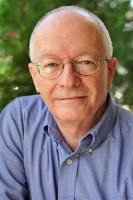 Henry’s debut novel, Journey to Riverbend, won the 2009 Operation First Novel contest.
Henry’s debut novel, Journey to Riverbend, won the 2009 Operation First Novel contest.Henry edits novels, leads critique groups, and teaches at conferences and workshops. He enjoys mentoring and coaching individual writers.
Connect with Henry on his BLOG, TWITTER and FACEBOOK.
Published on April 26, 2023 22:00



